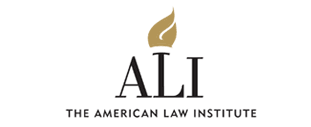Related Research Articles
The Uniform Crime Reporting (UCR) program compiles official data on crime in the United States, published by the Federal Bureau of Investigation (FBI). UCR is "a nationwide, cooperative statistical effort of nearly 18,000 city, university and college, county, state, tribal, and federal law enforcement agencies voluntarily reporting data on crimes brought to their attention".

The American Law Institute (ALI) is a research and advocacy group of judges, lawyers, and legal scholars established in 1923 to promote the clarification and simplification of United States common law and its adaptation to changing social needs. Members of ALI include law professors, practicing attorneys, judges and other professionals in the legal industry. ALI writes documents known as "treatises", which are summaries of state common law. Many courts and legislatures look to ALI's treatises as authoritative reference material concerning many legal issues. However, some legal experts and the late Supreme Court Justice Antonin Scalia, along with some conservative commentators, have voiced concern about ALI rewriting the law as they want it to be instead of as it is.

The Appellate Division of the Supreme Court of the State of New York is the intermediate appellate court in New York State. The state is geographically divided into four judicial departments of the Appellate Division. The full title of each is, for example, the "Fourth Department" is "Supreme Court of the State of New York, Appellate Division, Fourth Judicial Department").
Legal ethics are principles of conduct that members of the legal profession are expected to observe in their practice. They are an outgrowth of the development of the legal profession itself.

The Uniform Law Commission (ULC), also called the National Conference of Commissioners on Uniform State Laws, is a non-profit, American unincorporated association. Established in 1892, the ULC aims to provide U.S. states with well-researched and drafted model acts to bring clarity and stability to critical areas of statutory law across jurisdictions. The ULC promotes enactment of uniform acts in areas of state law where uniformity is desirable and practical. The ULC headquarters are in Chicago, Illinois.

UNIDROIT is an intergovernmental organization whose objective is to harmonize private international law across countries through uniform rules, international conventions, and the production of model laws, sets of principles, guides and guidelines. Established in 1926 as part of the League of Nations, it was reestablished in 1940 following the League's dissolution through a multilateral agreement, the UNIDROIT Statute. As of 2023 UNIDROIT has 65 member states.
No-fault divorce is the dissolution of a marriage that does not require a showing of wrongdoing by either party. Laws providing for no-fault divorce allow a family court to grant a divorce in response to a petition by either party of the marriage without requiring the petitioner to provide evidence that the defendant has committed a breach of the marital contract.
Harrison Tweed was an American lawyer and civic leader.

The State Bar of Texas is an agency of the judiciary under the administrative control of the Texas Supreme Court. It is responsible for assisting the Texas Supreme Court in overseeing all attorneys licensed to practice law in Texas. With more than 100,000 active members, the State Bar of Texas is one of the largest state bars in the United States. Unlike the American Bar Association (ABA), the State Bar of Texas (SBOT) is a mandatory bar. The State Bar is headquartered in the Texas Law Center at 1414 Colorado Street in Austin.
Continuing legal education (CLE), also known as mandatory or minimum continuing legal education (MCLE) or, in some jurisdictions outside the United States, as continuing professional development, consists of professional education for attorneys that takes place after their initial admission to the bar. Within the United States, U.S. attorneys in many states and territories must complete certain required CLE in order to maintain their U.S. licenses to practice law. Outside the United States, lawyers in various jurisdictions, such as British Columbia in Canada, must also complete certain required CLE. However, some jurisdictions, such as the District of Columbia and Israel, recommend, but do not require, that attorneys complete CLE.
The International Association of Culinary Professionals (IACP) is a United States-based not-for-profit professional association whose members work in culinary education, communication, or the preparation of food and beverage.
The Washington State Bar Association (WSBA) is the state bar association of the U.S. state of Washington. It operates under the delegated authority of the Washington Supreme Court to license the state's nearly 41,000 active and inactive lawyers and other legal professionals. In furtherance of its obligation to protect and serve the public, the WSBA regulates lawyers and other legal professionals and serves its members as a professional association. The WSBA's mission is to serve the public and the members of the Bar, to ensure the integrity of the legal profession, and to champion justice.
Collaborative law, also known as collaborative practice, divorce or family law, is a legal process enabling couples who have decided to separate or end their marriage to work with their collaborative professionals including collaboratively trained lawyers, coaches and financial professionals in order to avoid the uncertain outcome of court and to achieve a settlement that best meets the specific needs of both parties and their children without the underlying threat of litigation. The process allows parties to have a fair settlement. The voluntary process is initiated when the couple signs a contract binding each other to the process and disqualifying their respective lawyer's right to represent either one in any future family-related litigation.

The State Bar of Michigan is the governing body for lawyers in the State of Michigan. Membership is mandatory for attorneys who practice law in Michigan. The organization's mission is to aid in promoting improvements in the administration of justice and advancements in jurisprudence, improving relations between the legal profession and the public, and promoting the interests of the legal profession in Michigan.

Children At Risk is a 501(c)(3) non-profit organization that drives changes for children through research, education, and influencing public policy. Founded in the year of 1989 in Houston, Texas and with an office opened in North Texas in 2011, the organization focuses on the well-being of children and educates legislators on the importance of solving children's issues while at the same time focusing on a variety of issues, and the primary issues are human trafficking, food insecurity, education, and parenting. Children At Risk also has a North Texas office in Dallas, Texas. Some of Children At Risk's previous primary issues were juvenile justice, mental health, and Latino children.

The Alabama State Bar is the integrated (mandatory) bar association of the U.S. state of Alabama.

Harry Lee Tindall is a founding shareholder of Tindall & England, P.C. in Houston, Texas. The firm is ranked as a top tier firm by both Martindale Hubbell and U.S. News & World Report.
Indian Association of Clinical Psychologists (IACP) is the national association of clinical psychologists in India. It was founded in 1968. As of 2019, the President of the association is Dr. Kalpana Srivastava. IACP publishes its flagship journal entitled Indian Journal of Clinical Psychology (IJCP). IACP confers following professional awards in clinical psychology:
- C S Kang Award for overall contributions in clinical psychology
- H N Murthy Award for contributions in behavioral medicine and bio-feedback
- Psycho-Oration for life time contribution in substance use disorder and mental health
- Child and adolescent award previously known as Asha Nigam award for work in child and adolescent mental health
- S C Gupta Best Paper for the best presentation in the NACIACP scientific sessions
- Young Scientist award who has done a commendable research work
- Forensic Psychology Award
- Awards for best paper in each session of its National Annual Conference

Ruth Halperin-Kaddari is an Israeli legal scholar and international women's rights advocate who is known for her work on family law, feminist legal theory, women's rights in international law, and women and religion. She was a member of the United Nations Committee on the Elimination of Discrimination against Women from 2006 to 2018, and was the committee's vice chair during several terms. She is Professor of Law at the Bar-Ilan University and is the founding Academic Director of the Ruth and Emanuel Rackman Center for the Advancement of the Status of Women. She is also involved in international academic collaborations on the theme of women, state, and religion, and participates in international litigations as an expert on Israeli family law.

In the United States, those seeking to become lawyers must normally pass a bar examination before they can be admitted to the bar and become licensed to practice law. Bar exams are administered by states or territories, generally by agencies under the authority of state supreme courts. Almost all states use some examination components created by the National Conference of Bar Examiners (NCBE). Forty-one jurisdictions have adopted the Uniform Bar Examination (UBE), which is composed entirely of NCBE-created components.
References
- ↑ Rebecca Glass. "Tipping Toward Civility: Developing Collaborative Law in the U.S. and Canada". Archived from the original on 2013-09-10. Retrieved 2013-09-13. International Academy of Collaborative Professionals website Retrieved 2013-6-30.
- ↑ Kris Axtman. "Make Way for the Friendly Divorce," Christian Science Monitor, May 24, 2004". Archived from the original on 2014-06-10.Retrieved 2013-7-8.
- ↑ Andi Wray. "Parting is sweet sorrow when couples collaborative". Archived from the original on 2014-01-09. Retrieved 2013-07-09. Jamaica Observer, Dec. 9, 2002, Retrieved 2013-7-8.
- ↑ orma Trusch. "What Every Therapist Should Know About Collaborative Law," Law Office of Norma Levine Trusch website"., Retrieved 2013-7-1.
- ↑ Jennifer Tull. "Lawyers in Community: A Lesson in Precession," Paper delivered to the International Association of Holistic Lawyers Annual Conference, November 2004". Archived from the original on 2013-10-28. Retrieved 2013-07-02., Retrieved 2013-7-8.
- ↑ Kris Axtman. "Friendly' divorce movement gains ground," Christian Science Monitor, May 21, 2004"., Retrieved 2013-7-1.
- ↑ Dave Moore. "Happier Ending Through Collaborative Divorce," D Magazine, May 12, 2010". Archived from the original on May 11, 2013. Retrieved July 1, 2013., Retrieved 2013-7-1.
- ↑ Cheryl Hall. "Ending the Marriage, Not the Business," Dallas Morning News, April 5, 2009" (PDF). Archived from the original (PDF) on January 9, 2014. Retrieved July 9, 2013.
- ↑ " "Committees page, Collaborative Law Institute of Texas website"., Retrieved 2013-6-30.
- ↑ Bill Hetchcock. "T. Boone Pickens on how to save millions on your divorce," Dallas Business Journal, Mar. 1. 2013"., Retrieved 2013-6-30.
- ↑ "39th Annual Advanced Family Law Course brochure PDF, State Bar of Texas website" (PDF)., Retrieved 2013-6-30.
- ↑ Collaborative Law Section Bylaws page, State Bar of Texas website.
- ↑ "2009-10 State Bar of Texas Section Reports"., Retrieved 2013-7-1.
- ↑ "Alabama Enacts Uniform Collaborative Law Act, Uniform Law Commission website". Archived from the original on 2014-01-09. Retrieved 2013-06-30., Retrieved 2013-6-30.
- ↑ "Texas Legislature Online".[ permanent dead link ], Retrieved 2013-7-8.
- ↑ "Uniform Collaborative Family Law Act Signed by Gov. Perry, Collaborative Law Institute of Texas blog, June 20, 2011". Archived from the original on January 9, 2014. Retrieved June 30, 2013., Retrieved 2013-6-30.